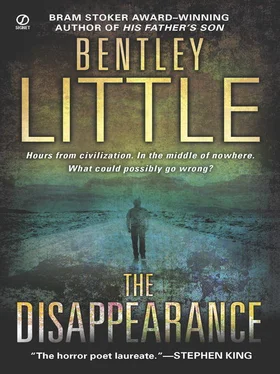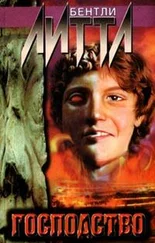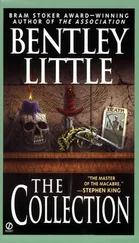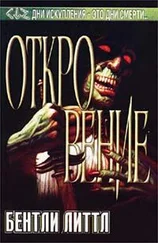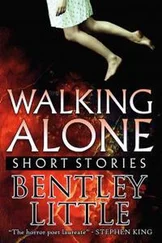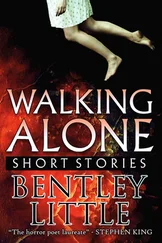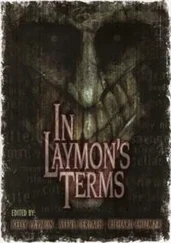But they did not stop in town. They kept going, gaining speed, heading west.
And they were free.
Joan followed Absalom through a series of hallways to an area of the Home that she remembered only too well. The muzzle was on, covering her mouth, nose and chin with crisscrossing leather straps, and although she could speak, it effectively restrained her head and gave the old man the ability to pull her along like a dog on a leash.
To her right was the Dining Room, and it looked exactly as she remembered: the long wooden tables and uncomfortable benches, the open window leading to the Kitchen, the high beamed ceiling, the walls bare save for the life-sized photo of Father framed at the north end. To her left was the Chapel, and, as was always the case, there were people kneeling on the hard stone floor, both Residents and Penitents, worshipping and praying. Simply looking into the Chapel brought back a flood of sense memories, and her knees could feel the pain of remaining bent on that floor for hours, her arms the strain of holding her clasped hands in perfect position the entire time, her throat, stomach, bowels and bladder the agony of not being able to drink, eat or go to the bathroom.
Absalom yanked on her strap, pulling her forward.
Joan’s heart leapt in her chest.
Ahead, the Children were lining the corridor before Father’s Room, some standing, some sitting in wheelchairs, a few lying on ambulatory devices that resembled gurneys with steering wheels. She did not want to continue on. Even under the best of circumstances, she was unnerved by the Children, and the thought of passing by them now filled her with dread. Seeing the girl who had brought her food, Joan tried to smile at her, but the child stared back, blank-eyed like the others.
These were not Children like her mom and the others who had been integrated into normal life at the Home. These were the ones who were damaged, the ones who might be entrusted with simple tasks but more often than not were simply housed here, with the vague promise that one day God or Father would reveal their purpose. It had only been five years, but there seemed to be more of them than there used to be, and each succeeding generation appeared worse off than the last, which made perfect sense to someone like her who had learned real science but was probably very confusing to a lot of the Residents, particularly the younger ones.
Joan followed Absalom up the corridor, trying not to look to either side, trying to focus on the old man’s back in front of her and the closed double doors of Father’s Room beyond. Absalom was walking more slowly here, and she was certain that was on purpose, even though there was no way he could know about her fear of the Children.
Finally, after what seemed like ten minutes but was probably only one, they neared the end of the corridor. Inadvertently, she glanced to her right. At the head of this gathering, closest to the door, was a figure she recognized, wearing a grin she’d never forgotten. It was the little man who’d been standing in the hallway on the night she and her parents had escaped. He looked the same as he had then, with his big feet and oversized head, and he grinned dumbly at her, the same way he had on that night. If the door had not opened at that moment and she had not been yanked inside, she probably would have screamed.
But suddenly she was in Father’s Room, and the door was closing behind her.
Joan reached up and began unfastening the muzzle from the back of her head where it was strapped. The room was filled with people, and she was not about to stand in front of them like an animal with this contraption over her face. She expected Absalom to try to stop her, but he obviously knew that there was no way she could escape, nowhere she could go, and he made no effort to keep her from freeing herself. Besides, he had brought her here. His job was done.
Father would take over from this point.
Joan freed herself from the muzzle, letting the leather device drop onto the floor. She remembered with perfect clarity the last time she had been in here, the only time she had been in here, and she saw instantly that nothing had changed. At the head of the room was a floor-to-ceiling bookcase filled with religious tomes, and a massive cabinet containing copies of every prayer scroll ever written. Between the two sat the doorway that led to Father’s sleeping chamber, and scattered randomly through the center of the long rectangular room, almost like the elements of an obstacle course, were various pieces of antique furniture, not all of which seemed appropriate to the room’s purpose. There was a dining table with no accompanying chairs; a Victorian fainting couch; an ornately carved armoire; a rolltop desk; a marble bust of an old man with a long white beard, presumably God; a glass-doored cabinet filled with knives and swords; and an empty baker’s rack. Along the walls were wooden benches and, above the benches, painted directly onto the stucco, poorly rendered scenes from the Bible. They were all scenes of violence, Joan noticed now: Cain killing Abel, Abraham preparing to sacrifice his son, Christ being crucified. Father must have painted them himself. He wasn’t much of an artist, she thought, and the realization gave her confidence and a strange sense of comfort.
Father wasn’t here yet, but the door to his sleeping chamber was open, and everyone was obviously awaiting his arrival.
How old was he now? It was hard to tell. He had fathered her mom and had fathered her mom’s mom, and though both her grandmother and her great-grandmother had been young at the time, in their early teens, that probably put him somewhere in his eighties or nineties.
When was he going to die?
Not soon enough , she thought.
She should be grateful for small favors. At least he had not fathered her . And he had allowed her mom to marry someone else. Although he had wanted Joan to—
She pushed the memory from her mind.
The people in the room, seated on the benches, seated on the floor, standing in the corners, were talking among themselves. Their eyes kept returning to her, though no one would look at her directly. How many? she wondered. Twenty or thirty, at least. Not everyone who lived in the Home by a long shot, but enough that the big room seemed crowded. Father had probably called them here specifically to view her perceived humiliation, to drive home the point to both them and her that escape was not possible, that even those who managed to get out would be brought back for punishment sooner or later.
Joan had lost track of Absalom, but she saw him now, standing before the bookcase next to the door to Father’s sleeping chamber. He was with one of the other Teachers, a man she recognized but whose name she could not recall. The two men conferred for a moment; then Absalom moved so that each of them was on an opposite side of the door. “Quiet!” they announced in unison, speaking the Language.
The room was silenced.
All eyes were on Father as he emerged from the darkness.
Kara was by his side.
Kara?
Joan stood there, shocked. The last thing in the world she expected to see here was her roommate. The juxtaposition was jarring, her new life intruding into her old life, the Outside world coming into the Home.
And Kara was with Father? How was that even possible? It made no sense on any level whatsoever, and Joan was filled with a profound despair as she saw how her friend was wearing not a look of fear, panic or even coerced cooperation, but an expression of blind contentment.
Converts, Joan knew from experience, were often more hard-core than people who had been born and raised in the Home, and although that had not been true of her father, she had the feeling that it was for Kara. Something in her friend’s eyes bespoke not just belief but a willingness—no, a need— to impress that belief upon others.
Читать дальше
